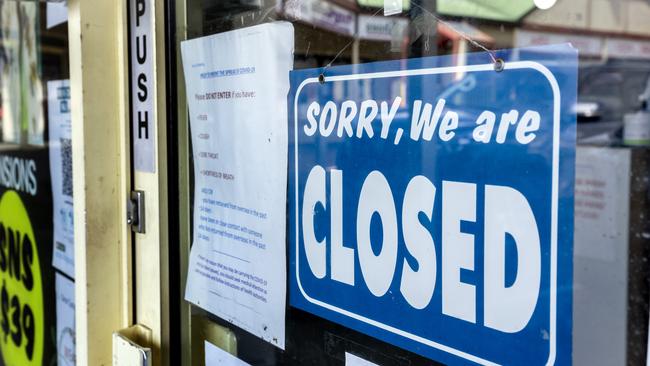More business failures likely in fallout from Trump’s trade policies: CreditorWatch
CreditorWatch warns that more businesses are at risk of going bust amid the impact of Donald Trump’s tariffs, following a surge in failures in the past year.
US President Donald Trump’s ongoing changes to trade and tariff policies, coupled with a deteriorating Australian dollar, are set to exacerbate financial pressures on local businesses as failures surge by nearly half over the past year.
The latest Business Risk Index from credit reporting agency CreditorWatch shows a 42 per cent jump in business-to-business invoice defaults in March compared to a year ago – an ominous sign for future insolvencies, which were up 17 per cent year-on-year in February.
Cost-of-living and cost-of-doing-business pressures continue to squeeze firms, particularly in discretionary sectors that rely on household spending and have been hit by high interest rates, rent increases and slowing wage growth.
Mr Trump’s ongoing tariff changes have sparked volatility and widespread selling in financial markets, while also weakening the Australian dollar to multi-year lows against the US dollar, British pound and the euro in the past week – fuelling uncertainty for consumers and businesses.
CreditorWatch chief economist Ivan Colhoun said the combination was immediately damaging.
“These uncertainties (will) cause either consumers or businesses to delay purchases, hiring or investment decisions; the impact is a slowdown in economic activity, which will pressure weaker businesses,” he said.

The flow-on effect could trigger a fresh uptick in business failures over coming months, despite the Reserve Bank of Australia’s February rate cut and another potential reduction in May.
“Along with pressures from previous cost increases, this is likely to keep payment defaults and insolvencies elevated in the months ahead,” Mr Colhoun said.
He added that while there could be upside for some firms able to access cheaper tariffed imports, for many Australian producers that would simply add to margin pressure. “It’s a very uncertain time for businesses and consumers by virtue of the significant and ongoing changes to US tariff and trade policies,” he said.
A record-high 9.4 per cent of businesses in the food and beverage sector closed their doors in the year to March – nearly double the national average of 5.3 per cent.
The sector remains at the sharp end of inflationary pressures, with rising rents, wages and input costs hitting at the same time as cash-strapped consumers cut back on discretionary spending.
CreditorWatch chief executive Patrick Coghlan said Australian households were in “desperate need of cost-of-living relief”, with ripple effects flowing directly into the small business sector.

“Households don’t have many levers they can pull to save extra money, but they can certainly reduce costs in areas such as entertainment spending, retail purchases, services such as cleaners and gardeners and, on a larger scale, put off building a new house,” he said.
Business failure rates have returned to or exceeded pre-Covid levels across most discretionary sectors, including administrative support, arts and recreation, retail and accommodation.
Construction – long a pressure point – continues to struggle under the weight of surging material costs and a high share of firms with significant tax debts.
CreditorWatch data shows about 30,000 businesses owe the Australian Taxation Office more than $100,000 – a figure that has historically been a key predictor of insolvency. The construction and food and beverage sectors are the most exposed, and the number of firms entering payment plans with the ATO has declined significantly since October.

Business exits are now well above levels of the pre-pandemic decade. As a share of total company registrations, the trend suggests a rising rate of failure even as the business population grows.
Six of the highest-risk areas in the country are in Western Sydney, led by Bringelly-Green Valley, where the average business closure rate is forecast to hit 7.9 per cent over the next 12 months.
In contrast, Norwood-Payneham-St Peters in inner Adelaide is expected to see just 4.5 per cent of businesses fail.
Adelaide’s CBD also boasts the lowest capital city failure forecast at 5.2 per cent, while Sydney sits at the top with 6.3 per cent.
More Coverage
Originally published as More business failures likely in fallout from Trump’s trade policies: CreditorWatch





